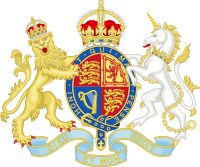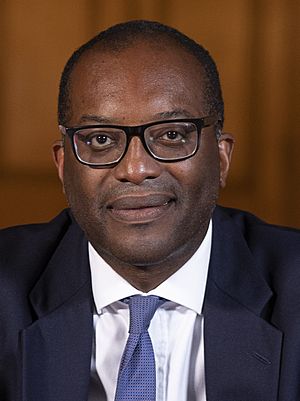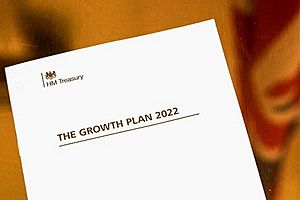September 2022 United Kingdom mini-budget facts for kids
 |
|
| Presented | 23 September 2022 |
|---|---|
| Parliament | 58th |
| Party | Conservative Party |
| Chancellor | Kwasi Kwarteng |
|
‹ October 2021
2022 autumn statement ›
|
|
On 23 September 2022, the UK's finance minister, Kwasi Kwarteng, announced a plan called "The Growth Plan." People often called it a mini-budget because it wasn't a full official budget. This plan included many tax cuts, which meant people and companies would pay less tax.
Some of the main ideas were to lower the basic rate of income tax, get rid of the highest income tax rate, and cancel increases in National Insurance and corporation tax. However, many of these changes were later reversed because of how the economy reacted.
The mini-budget was one of the first big actions by the government led by Prime Minister Liz Truss, who had just started her job. At the time, the UK was already facing a cost-of-living crisis, meaning prices for everyday things were going up.
After the mini-budget was announced, the value of the pound sterling (UK money) dropped sharply against the US dollar. This happened because global markets were worried about the UK government borrowing a lot more money. Many economists also criticized the plan, fearing it could lead to serious economic problems.
The International Monetary Fund (IMF), a big global financial group, even spoke out against the budget. They said it would "likely increase inequality" and asked the UK government to rethink its tax cuts.
Despite the worries, Prime Minister Liz Truss and Kwasi Kwarteng first insisted their plans would continue. But as market problems continued, Truss asked Kwarteng to resign on 14 October. She then appointed Jeremy Hunt as the new finance minister. Hunt quickly reversed most of the tax cuts from the mini-budget, which helped calm the markets.
Liz Truss resigned as Prime Minister on 25 October. Her replacement, Rishi Sunak, kept Jeremy Hunt as finance minister. The government's next big economic plan was moved to November and became a full "autumn statement."
Contents
What Led to the Mini-Budget?
The mini-budget happened during a time when the cost of living was very high in the UK. Prices for things like energy were rising quickly. During the summer of 2022, when Liz Truss was campaigning to become Prime Minister, she promised to cut taxes a lot. She believed this would help the economy grow.
Truss won the election and became Prime Minister in September 2022. She then chose Kwasi Kwarteng, who shared her economic ideas, to be her finance minister. On 15 September, it was reported that Kwarteng was planning an emergency budget for 23 September.
Before the mini-budget, the government had already announced plans to help with energy bills. They also said they would reverse a recent increase in National Insurance and cancel a new Health and Social Care Levy. The Bank of England also raised interest rates to try and control rising prices.
Normally, an independent group called the Office for Budget Responsibility (OBR) checks government spending plans. They offered to provide a forecast for the mini-budget, but the government said they didn't have time to wait. This worried many people because it meant the plans weren't checked independently.

Some government officials had warned against big tax cuts funded by borrowing without an OBR forecast. They feared it would be too risky for the economy. The economic ideas of Truss and Kwarteng, which suggested that lower taxes would make the economy grow enough to pay for themselves, were sometimes called "Trussonomics."
Later, after Truss resigned, Kwasi Kwarteng said he had warned her that her economic plans were moving "too fast." Treasury officials also told politicians that they had advised Kwarteng about the risks, but he decided to go ahead anyway.
What Was in the Mini-Budget?
| Major measures by cost over 5 years | ||||
|---|---|---|---|---|
| £ millions | ||||
| National Insurance increase reversal | 76,965 | |||
| Corporation Tax cancel increase |
63,175 | |||
| Energy bills support 2022–23 | 60,000 | |||
| Cost of living support announced May 2022 | 15,350 | |||
| Stamp Duty reduction | 7,030 | |||
| Income Tax remove 45% rate band |
6,790 | |||
| IR35 easing |
6,190 | |||
| Income Tax from 20% to 19% |
5,480 | |||
| Annual Investment Allowance increase | 5,315 | |||
| VAT free shopping |
5,280 | |||
| No clawback on previous energy support | 4,780 | |||
| Alcohol Duty freeze/reform |
2,520 | |||
| Dividend Tax increase reversal |
2,420 | |||
| Venture/Employee share schemes reform | 280 | |||
|
|
||||
The mini-budget, also called "The Growth Plan," aimed to boost the economy by cutting taxes. The government planned to pay for these cuts by borrowing more money, which would increase the United Kingdom national debt. The total cost of the plan was huge, making it the biggest tax cut in the UK in 50 years.
The plan also set a goal for the economy to grow by 2.5% each year. Because the Office for Budget Responsibility wasn't asked to check the plans, the government called it a "fiscal event" instead of a full budget.
A group called the Resolution Foundation later estimated that the mini-budget cost the country about £30 billion. This was due to the tax cuts and the higher borrowing costs that happened because of how the markets reacted.
Main Points of the Plan
Here are some of the key things announced in the mini-budget:
- Lowering the basic rate of income tax from 20% to 19% starting April 2023. (This was later stopped).
- Getting rid of the 45% highest rate of income tax for the richest people. (This was also stopped).
- Reversing the 1.25% increase in National Insurance that started in April 2022.
- Canceling plans for a new Health and Social Care Levy.
- Stopping an increase in corporation tax from 19% to 25%. (This was later stopped).
- Asking more people on Universal Credit to look for more work or face losing some benefits.
- Giving people over 50 more help to find jobs.
- Making changes to tax rules for self-employed workers (called IR35 rules). (This was later stopped).
- Keeping a tax-free allowance for company investments at £1 million.
- Changing rules to let pension funds invest more in the UK.
- Offering tax breaks for investors in new and start-up companies.
- Doubling the maximum share options for employees from £30,000 to £60,000.
- Raising the amount of money people can spend on a house before paying stamp duty (a tax on property).
- Freezing energy bills for two years, which was expected to cost £60 billion over six months. (This was later reduced to six months).
- Removing the limit on bankers' bonuses.
- Bringing back VAT-free shopping for visitors from other countries. (This was later stopped).
- Canceling planned increases in taxes on alcohol.
- Planning for "investment zones" in England, where rules would be simpler to encourage business.
- Making planning laws easier and getting rid of some old EU rules.
The finance minister also announced that the Office of Tax Simplification would be closed.
How People Reacted
Money, Interest Rates, and Debt
After the mini-budget, the pound sterling dropped sharply. It lost 3% against the US dollar and fell to its lowest point since 1971. This made people worry that £1.00 might soon be worth only $1.00.
To try and calm the markets, the Treasury said Kwasi Kwarteng would release more details on 23 November about how the plans would be paid for. The Bank of England also said it would "not hesitate" to raise interest rates if needed.
Banks and building societies started pulling some mortgage deals because they were worried about interest rates going up. By 29 September, 40% of mortgage products were no longer available. By 5 October, the interest rate on a typical two-year fixed mortgage went above 6% for the first time since 2008. This also led to a fall in house prices in October.
The Bank of England later said they were not fully warned about what would be in the mini-budget.
Bond Markets
The plan to borrow a lot more money caused problems in the bond market. This is where governments borrow money by selling "bonds." The cost of borrowing for the UK government went up very quickly.
To stop a bigger crisis, the Bank of England announced on 28 September that it would temporarily buy UK government bonds. This was because some pension funds were at risk of collapsing. The Bank bought billions of pounds worth of bonds to stabilize the market.
The Bank of England said its bond-buying scheme would end on 14 October. Even though some groups asked for it to be extended, the Bank's Governor, Andrew Bailey, said it would end as planned.
When Jeremy Hunt became the new finance minister and reversed most of the tax cuts, the cost of government borrowing started to fall. After Rishi Sunak became Prime Minister, borrowing costs returned to levels seen before the mini-budget.
Businesses and the Economy
Business groups had mixed reactions. Some right-leaning groups welcomed the plan, saying it would boost the economy. They liked the idea of tax cuts and simpler rules. For example, the director-general of the Institute of Economic Affairs called it a "boost-up budget."
However, many economists were worried. Paul Johnson from the Institute for Fiscal Studies called the plans a "big gamble." He said that putting more money into the economy when prices were already high could make inflation worse. Many economists found it hard to support the government's approach.
Some economists compared the UK's situation to an "emerging market" economy, which usually means a less stable economy. They even drew comparisons to the 1976 sterling crisis, when the UK had to ask the International Monetary Fund for financial help.
The Institute for Fiscal Studies said the government's debt was on an "unsustainable rising path." They suggested that the government would need to make big spending cuts to fix this. The IMF also warned that the plans would make it harder to fight rising prices.
Media Reaction
Newspapers had different views on the mini-budget. Right-leaning newspapers generally liked it. The Daily Mail called it "A true Tory budget." The Daily Express said it would put Britain "back on top."
Other newspapers were more critical. The i newspaper said the fall in the pound was a "punishing early verdict." The Independent quoted a union leader who called it "Robin Hood in reverse," meaning it took from the poor and gave to the rich. The Guardian described it as a "budget for the rich."
Political Reaction
The Labour Party called the mini-budget "casino economics." They said it would mostly help the wealthy. Labour's leader, Keir Starmer, said his party would reverse the cut to the top rate of income tax if they won the next election.
Some members of the Conservative Party also disagreed with the tax cuts. Michael Gove, a senior Conservative MP, said removing the top tax rate showed "the wrong values." There were reports that some Conservative MPs were ready to vote against parts of the plan.
Other politicians, like Nigel Farage, supported the mini-budget, calling it "the best Conservative budget since 1986."
Some reports suggested that the mini-budget failed partly because the government didn't explain its goals clearly enough to the public. Phrases like "supply-side reforms" were not easy for everyone to understand.
Opinion Polls
Opinion polls showed a big drop in support for the Conservative Party after the mini-budget. A YouGov poll showed Labour 17% ahead, which was the biggest lead since 2001. Only 19% of people thought the mini-budget was "fair."
Another YouGov poll showed Labour's lead growing to 33%, the largest lead since the 1990s. Political experts said Labour was now "very clearly the favorites" to win the next election. Liz Truss's approval rating also fell very low.
One poll even suggested that if an election happened, Labour could win 411 seats in Parliament, while the Conservatives might only win 137. This would be a huge win for Labour, similar to the 1997 election.
Liz Truss Resigns as Prime Minister
After the mini-budget, many Conservative Members of Parliament (MPs) publicly asked Liz Truss to resign. They felt the public had lost trust in her government's plans. Bookmakers even started taking bets on when she would leave office.
Normally, a party leader cannot be challenged for 12 months after winning a leadership contest. But some MPs wanted to change the rules or force a general election. The Labour Party started an advertising campaign calling for a general election.
On 17 October, Liz Truss faced questions from Parliament. She said she was "sorry for the mistakes that have been made" but insisted she was "a fighter and not a quitter." She said she would lead the Conservatives into the next general election.
However, on 19 October, the Home Secretary, Suella Braverman, resigned and criticized the government's change of policy. There were also reports of chaos during a vote in Parliament.
On 20 October, Liz Truss announced her resignation. She said she could not deliver the promises she made when she was elected leader. She had been Prime Minister for only 45 days, making her the shortest-serving UK prime minister ever.
Rishi Sunak then became Prime Minister without anyone else challenging him. In his first speech, Sunak warned that "difficult decisions" were needed to fix the "profound economic crisis."
What Happened Next?
Jeremy Hunt stayed on as finance minister in Sunak's government. He moved the date of the next big economic statement to 17 November, making it a full "autumn statement" to ensure it was based on the most accurate forecasts.
Michael Gove, a senior Conservative MP, later wrote that the party had "made the wrong choice" by voting for Truss. He said the tax cut plans were "a holiday from reality."
Kwasi Kwarteng later said in an interview that he had warned Truss her economic changes were happening too fast. He recalled telling her, "You will have two months if you carry on like this." Truss later admitted she "didn't do everything perfectly" but was trying to deal with serious issues.
In March 2023, several BBC journalists won an award for their interviews with Liz Truss during her time as Prime Minister. These interviews were seen as very important in showing the problems her government faced.
See also
- Annual Meetings of the International Monetary Fund and the World Bank Group
- Bond vigilante
- Budget of the United Kingdom
- Free Enterprise Group
- Laissez-faire
- March 2021 United Kingdom budget
- Singapore-on-Thames
 | Kyle Baker |
 | Joseph Yoakum |
 | Laura Wheeler Waring |
 | Henry Ossawa Tanner |


